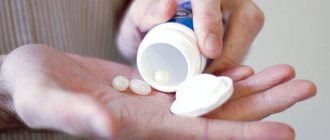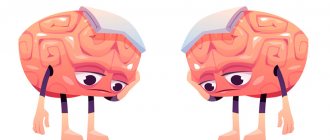Before you understand how panic attacks are treated, you should understand what kind of disorder it is, the reasons for its development, who is susceptible to it, and what the symptoms are.
The human body responds to stress by releasing the hormone adrenaline. It triggers a mechanism that prepares the body to confront a dangerous situation or escape: the heart begins to beat faster, breathing quickens. This leads to increased ventilation of the lungs and, as a result, the level of carbon monoxide in the blood decreases, causing dizziness, tingling in the fingers, numbness of the arms and legs.
Nature initially instilled in people just such an algorithm for responding to danger, so this is quite normal and characteristic of all representatives of homo sapiens. However, if such a mode “turns on” for no reason, then this will already be a manifestation of a panic attack, which is a mental disorder - one of the subtypes of anxiety conditions.
Types and causes of the disease
There are quite a lot of people in the world who are susceptible to panic attacks - up to 5% (most of them are women between 20 and 30 years old).
There are 3 types of panic attacks:
- spontaneous – sudden, appears without any obvious reason;
- situational - occurs in anticipation of a certain situation or directly during its course (before an exam, in anticipation of a conflict or directly during its course, etc.);
- conditional-situational - the impetus is a biological or chemical activator (change in hormonal levels, ingestion of alcoholic beverages, drugs, alcohol.
The following factors contribute to the occurrence of panic attacks:
- Genetic predisposition, that is, the disorder is transmitted with genes. In this case, it will be very difficult to cope with it and will take a long time.
- The presence of phobias, that is, fear of something.
- Poor monotonous diet, lack of vitamin B in the body.
- Significant event (wedding, birth of a child, death of a loved one, etc.)
- Certain diseases, inflammatory processes, hypoglycemia (low blood sugar), hyperthyroidism (activation of thyroid function), post-traumatic syndrome.
- Self-doubt, personal problems, failures in life.
- Having bad habits.
- Wrong lifestyle.
- Internal conflict.
- Depression.
- Taking strong antibiotics that have multiple side effects or are addictive.
- Withdrawal syndrome – refusal of alcohol. Such “withdrawal” often leads to nervous breakdowns and excessive anxiety.
- Hyperventilation syndrome from the habit of breathing deeply - this disrupts the balance of carbon and oxygen, which leads to the consequences mentioned above.
- Taking stimulants or narcotics, caffeine, antidepressants, or medications the simultaneous use of which is undesirable.
- Serious cardiovascular diseases that can lead to death. The person realizes this and at the slightest deterioration of the condition begins to panic.
- Consequences of very high physical or sports activities.
- Hormonal changes in the female body - pregnancy, before menstruation, menopause.
What is sleep apnea syndrome?
A person with this pathology stops breathing for more than 10 seconds during sleep. A problem is reported when the number of such episodes per hour reaches 10 or exceeds this value. In severe cases, respiratory arrest can last 20–30 seconds or more, and episodes of complete cessation of pulmonary ventilation (apnea) and its significant decrease (hypopnea) can take up to 60% of the total time of night sleep. At the same time, the structure of sleep is disrupted and its quality decreases, daytime sleepiness is noted, complaints of decreased performance and constant fatigue appear, deterioration of memory, reaction, and intelligence develops and progresses. In addition, sleep apnea causes the development of a number of serious diseases, leads to their progression and reduces the effectiveness of traditional treatment regimens.
There are:
- obstructive apnea (OSA),
- central apnea,
- mixed form.
The principle of manifestation of OSA and central sleep apnea
Central sleep apnea
This type of apnea is a consequence of disruption of the central nervous system. In people with central apnea, the airways are completely free during an episode of respiratory arrest and do not obstruct the movement of air. However, there is no breathing movement, so the lungs are not ventilated.
Obstructive sleep apnea (OSA)
It develops as a result of obstruction, that is, narrowing of the upper respiratory tract. As a result, during sleep, the airways are occasionally blocked by relaxed, sagging muscles or a recessed tongue. In this case, oxygen enters the lungs in insufficient quantities or does not enter at all, but the respiratory movements of the chest are maintained and even intensified.
Mixed apnea
It is characterized by a combination of two types of apnea - obstructive and central.
One of the most typical manifestations of OSA is characteristic intermittent snoring. It is customary to distinguish between two main types of snoring:
- uncomplicated, in which there are no breathing problems at night;
- complicated when sleep disturbance is present.
In people with OSA, snoring is always complicated.
OSA can be caused by congenital abnormalities of the pharynx (for example, enlarged tonsils)
Unlike central apnea, OSA is a widespread phenomenon. The disease occurs at any age, but most often develops in people 40-65 years old. Moreover, its likelihood increases with increasing age and weight of a person.
In the absence of obesity, the causes of OSA can be:
- congenital structural features of the facial skeleton,
- pathologies of the nasopharynx (hypertrophy of the tonsils, etc.).
Signs of a panic attack
Many people, unfortunately, do not understand that they were “visited” by a panic attack, believing that their heart suddenly “grabbed”. Indeed, the symptoms of a panic attack are similar to a vegetative crisis: rapid heartbeat, pulsation in the temporal regions, lack of air - difficulty breathing, pain in the chest and abdomen. However, medications taken “for the heart” do not improve the condition in any way.
Also, at these moments, a person begins to either sweat or feel chills, his limbs tremble, the skin becomes numb or tingles, there may be dizziness and nausea, and an upset stomach. Everything seems unreal to him, blurry, that this is not happening to him (derealization and depersonalization), he goes crazy or dies. The patient experiences incredible fear, but there are also individuals who, instead, feel sadness; they always want to cry or be aggressive.
We can talk about the presence of a mental disorder such as panic attack syndrome if attacks occur several times a day or a couple of times a month, and last several minutes or up to an hour (the average is from 15 to 30 minutes).
The attack appears unexpectedly, without any pretext, and not in some frightening or alarming situation: in a store, on the street, in a cinema, while driving a car, at home - on the sofa, and even in a dream. A person at this moment can either be among people or be alone.
It can hardly be said that all of the above is dangerous to health, but panic attacks can lead to the development of neuroses, depression, and phobias. A patient, having experienced an unexpected attack, even a very short one, several times, tries to do everything to avoid a recurrence. He becomes suspicious, loses confidence, constantly “listens” to himself, gets nervous and tries to avoid places and situations where and in what case this happened. That is, now he is afraid of just such an attack and lives in constant anxiety and phobic avoidance.
The mechanism of the onset of panic disorder is very simple to explain using an example. A completely prosperous person, usually a strong personality, living a normal life, received a very strong emotion (anger, fear, etc.) in a certain traumatic situation. The brain absorbs this experience and stores it in the unconscious. That is, the individual himself seems to have forgotten everything, but this is far from the case: the negative is securely stored in a distant corner of the memory and, over time, added to it are memories of the troubles that inevitably accompany our life, no matter how wonderful and calm it may be .
One fine day, some significant event happens, very joyful or sad (the birth of a child, the death of a parent), and it, by coincidence, becomes the last straw that overflows the vessel with memories. Then it “explodes” and the person has a panic attack.
This sudden attack worries and worries a person, even if it passed very quickly. Such a lack of understanding of what happened, anxiety, tension and excess emotions about this can provoke another attack, and then they will happen again and again. The patient is frightened by his physical and mental state at these moments, he tries not to visit those places where he was overtaken by an attack - phobias appear. As a result, panic disorder develops, and if this problem is left to chance, the consequences can be very sad.
What do these patients usually complain about to the neurologist?
The most common complaint is insomnia . It is difficult for them to fall asleep, sleep can be intermittent, the patient wakes up at 4-5 o'clock in the morning and then cannot fall asleep, although he needs to get up for work at 7.
Headache is also a common symptom. Patients may have dull, aching and pressing, monotonous headaches of moderate intensity (although there may be more severe pain), sometimes they feel heaviness in the head, staleness, difficulty concentrating, memory and performance deteriorate .
Some patients notice that they have become more irritable, anxious, or, on the contrary, more lethargic and apathetic.
Sometimes the patient complains of dizziness, which is felt inside the head; such dizziness can occur spasmodically in the subway, elevators, airplanes, large supermarkets, or simply when going outside from home.
Very often, patients may experience constant pain in the lumbar, thoracic or cervical spine. And, despite small and harmless changes revealed by X-ray or tomography of the spine, the use of various medicinal and non-medicinal treatment methods (tablets and injections, physiotherapy, massage, acupuncture, etc.), the pain does not go away.
Only with careful and confidential questioning is it possible to find out that the patient is depressed by the psychological trauma that happened, he is often (or constantly) in a bad mood, he has forgotten how to enjoy life as before, he does not see prospects in the current situation...
An experienced doctor understands that stress contributes to a decrease in the body's adaptive reserve, and other chronic diseases may also worsen in the patient - for example, peptic ulcer disease, chronic pancreatitis, psoriasis or rheumatoid arthritis. Stress provokes the occurrence of type 2 diabetes mellitus, essential arterial hypertension, autoimmune thyroiditis and other diseases.
But in our patient, all blood, urine, ultrasound, gastroscopy and other examinations are normal or slightly changed and cannot explain the patient’s poor health.
Why panic attacks need to be treated
The syndrome may not appear too often: the interval between attacks can be quite significant, but sooner or later, the panic will return anyway, that is, nothing will go away on its own.
The consequences of this are:
- Since a panic attack can take you by surprise at any time, in any place, in public, the person suffering from the disorder begins to avoid loved ones, friends, does not go anywhere, and withdraws into himself.
- Various phobias develop - fear of open space, darkness, phenomena, i.e. anything.
- Psycho-emotional disorder leads to personality disorder.
- Self-doubt develops, which affects personality, appearance, family relationships, and professional activities.
- Sleep is disturbed, appetite is lost, and the body becomes dehydrated. As a result, the body suffers.
- Refusal to share problems causes problems in the nervous system.
It is imperative to get rid of this problem, since, judging by the above, it brings problems in social adaptation, worsens the quality of life, interferes with normal work, and negatively affects the physical and mental state.
Meditation as the key to self-hypnosis
Meditation is the process of relaxing the body and focusing attention on one's own breathing, bodily sensations, or a foreign object. As a result, the mind is cleansed of negative thoughts, unnecessary experiences, and irritants from the outside world.
Using meditative techniques, a person is able to enter a trance-like hypnotic state and, through self-suggestion, achieve a state of serenity and harmony for sleep and calming the nervous system.
Instilling certain attitudes into yourself will allow you to change your habits, way of thinking and behavior. Thereby having a positive impact on well-being and self-realization in general.
Who to turn to for help and how to diagnose
Poor awareness among people about panic disorder leads to the fact that some consider it completely frivolous, while others consider it a dangerous incurable mental illness. Therefore, they believe, you should not go to doctors: in the first case there is no need, and in the second the main role is played by the fear of being branded as mentally ill. Both opinions are completely unfair: it is both very serious and completely controllable and treatable. A competent approach will allow you to successfully and fairly quickly get rid of the problem.
First of all, you need to understand that you need to contact only experienced, highly qualified specialists - a psychiatrist, who will develop treatment tactics based on the causes of a panic attack, because they are the ones that need to be eliminated. The doctor will determine why the patient’s nervous system could not withstand the load and malfunctioned in the form of panic manifestations.
The doctor must carefully examine the patient to establish an accurate diagnosis and study the symptoms. The selection of therapy is made based on the characteristics of the patient’s body on an individual basis. The work of a professional consists not only of recommendations and prescribing certain medications, but also of carefully monitoring the progress of treatment and, if necessary, its correction.
As for the psychologist, such a specialist is useless in this case - he is not able to identify the causes of the pathological disorder and prescribe medication and psychotherapeutic treatment, which, in case of getting rid of this problem, are necessary. The picture is the same with sorcerers, psychics and “wise” advisers from the Internet - they will only bring harm to the patient, which is then quite difficult to correct, aggravating his not the best condition.
The psychiatrist, first of all, will seek advice from a cardiologist, therapist, endocrinologist, neurologist, or psychotherapist. This is necessary to exclude the presence of somatic and serious mental illnesses.
It should immediately be noted that a therapist in ordinary clinics does not have the opportunity to carefully and competently examine the patient. In addition, long queues and the nervous atmosphere in them often serve as an impetus for another panic attack, and the person generally loses all desire to be treated.
In specialized paid clinics, such a picture is not observed: any person who comes here receives great attention. In addition, it is usually comfortable; highly qualified doctors work here, “armed” with advanced techniques and equipment for accurate diagnosis and successful treatment. The latter implies the use of pharmacology, psychotherapy, physiotherapy in combination, as well as changing the usual lifestyle.
The attitude of the patient himself to the treatment of panic attacks is also important - he must understand his problem, that this, in essence, is not a disease at all, but a sign of a disorder of higher nervous activity. For a successful result, you need the desire and good will of the patient, compliance with all the doctor’s recommendations.
Indications
In 95% of subjects, treatment of insomnia has a positive result. Trance acts comprehensively and helps solve several problems at once:
- reduce anxiety and anxiety;
- overcome uncertainty and internal fears;
- get rid of phobias;
- dull pain;
- relieve fatigue.
Influence on the subconscious is effectively used for virtually any disturbance of the state of rest, but is more often used for:
- single and multiple overvoltages;
- psychoemotional disorders;
- fatigue;
- improper daily routine;
- changing the daily alternation of night rest;
- external stimuli, for example, the noise of neighbors, the light of street lamps, air temperature, and so on.
Treatment of night rest disorder can be complex and alternate with other methods. Such as: physiotherapy, gymnastics, meditation for sleep.
Drug therapy
Certain medications can help reduce some of the symptoms of a panic attack. If the patient’s brain has a disturbance in the exchange of neurotransmitters, the balance of the processes of excitation and inhibition, then they are prescribed much more than in milder cases.
At the first stage, medications relieve the attack, and then restore the functioning of various brain systems. They are able to eliminate the panic state altogether, or weaken it.
- Tranquilizers are prescribed at the very beginning of treatment and not for long, as they cause addiction. These drugs extinguish the severity of the attack, stabilize the autonomic system, and normalize sleep.
- Antidepressants require caution - you need to be careful about their contraindications, so the selection is strictly individual. It is interesting that similar products from different manufacturers can have different effects on the patient.
- Antipsychotics are used extremely rarely - only if panic disorder cannot be cured with other medications, as well as in the presence of a personality disorder or metabolic disorders in the brain. In addition, they are very difficult to find.
- Neurometabolic drugs are very active, so they are used strictly in courses and administered in the presence of a doctor. They allow you to reduce the doses of other psychotropic drugs.
It is necessary to emphasize once again that all of the above medications are prescribed personally. The doctor should pay special attention to their effect on the patient, especially in the first days, monitor the intake, cancel and re-prescribe in case of adverse events.
Stages
Using an electroencephalograph, it was possible to conduct studies of the physiological state of the subject during sleep. This process has two cycles, which consist of two phases:
- slow;
- fast.
During the slow phase, the patient falls into a sound, deep sleep. The duration is ¾ of the cycle. All physiological processes slow down. In this state, cells are renewed, information is processed, and energy reserves are replenished.
The fast phase is much shorter and is only a quarter of the cycle. During the fast phase, the work of internal organs is activated, the heartbeat quickens, the temperature rises, and the work of the brain is activated.
The phases occur cyclically and are repeated several times. The duration of the fast phase increases each time.
Psychotherapeutic treatment
Panic attacks cannot be cured without psychotherapy using the following techniques:
1.Cognitive behavioral therapy is considered the most effective in this area - it is called the “gold standard”. The patient, with the help of a specialist, goes through several steps:
- changes your thoughts about panic to more positive ones;
- learns techniques that reduce anxiety;
- learns to overcome agoraphobia, etc.
This therapy models thinking and behavior during an attack. For example, the following situation is played out: you have a panic attack while you are driving a car. If you pull over and stop, will anything bad happen? Will you crash your car or die? Hardly! It is precisely this belief that the patient develops, and he ceases to be afraid of an attack.
2. Classic hypnosis involves putting the patient into a trance state, in which he is encouraged to get rid of panic disorder. This method shows good results, but not all people succumb to it.
3. Ericksonian hypnosis allows you to resolve internal conflicts. It is softer, since the person himself enters a trance with the help of a psychotherapist. Moreover, in this case it is believed that there are no non-hypnotizable people. In addition, the patient learns self-hypnosis, which helps him prevent panic attacks by reducing anxiety levels.
4. Body-oriented therapy is a whole set of methods that involve working with the body (by influencing it and regulating sensations, you can reduce the level of anxiety). This includes:
- breathing techniques;
- relaxation according to Jacobson.
5. Systemic family psychotherapy sees the cause of panic disorder in the family, in the relationships and disharmony existing there. That is, the patient’s condition depends on all members of his family, and therefore work is carried out with all of them.
6. Psychoanalyst sees the causes of panic attacks in unconscious conflicts - meaning feelings of guilt, problems with parents, internal aggression, etc. Therefore, the psychoanalyst will clarify these very conflicts for several years. It is this prolongation that is the disadvantage of this method.
Physiotherapeutic procedures such as:
- relaxing and tonic physical therapy;
- massage course;
- aromatherapy;
- mesodiencephalic modulation of the cerebral cortex (MDM therapy);
- electrosleep;
- color therapy.
During the course of treatment for PA, the patient may begin to doubt that it is happening correctly, that he needs psychotherapy and that it is truly successful, and that the medications have a positive effect. In addition, circumstances may turn out to be such that he violated the doctor’s recommendations and the prescribed regimen. At the same time, he may have a seizure. Therefore, the patient should not hesitate to ask for help or consult with his leading specialist. The latter will be ready at any time to answer all the patient’s questions both over the telephone and in a face-to-face meeting. Such communication, especially in the early stages, should be continuous.
help yourself
Early diagnosis and timely treatment allows you to completely get rid of panic attacks, of course, if they have become chronic. You can contribute to professional treatment at home or know how to relieve an attack and alleviate it, strengthen the body and eliminate negative factors.
The following folk remedies will help reduce fear:
- Pour 300 ml of boiling water over a teaspoon of dry oregano, leave for 10 minutes, strain. Drink 150 gr. four times a day.
- 100 gr. pour 500 ml of boiled water into young birch leaves. After infusion, strain for five hours. Take 100 ml every day.
- Infusion of linden or chamomile. Pour boiling water (a glass) over a teaspoon of dried inflorescences and after half an hour you can drink it as tea, having first strained it.
Motherwort juice is also good; alcohol tincture of oregano; decoctions of lemon balm and mint; infusions of valerian, wormwood, nettle, hops.
You can help an upset psyche by walking on grass or bare ground with bare feet (even in the cold season) - this calms you down.
Aromatherapy gives excellent results - candles with essential oils of pine, eucalyptus, juniper. A massage with these substances won't hurt either.
Experts advise drinking as little strong tea and coffee as possible, sitting less at the computer and in front of the TV, walking more in the fresh air, playing sports and being physically active. The day should be distributed correctly between time for work, rest and sleep. You need to monitor your diet - it should be rational and not contain spicy seasonings. Avoid bad habits (smoking, alcohol), take vitamins.
Those susceptible to panic attacks should adhere to the following rules:
- Don't be alone, don't isolate yourself. Communicate with family and friends, tell them about your condition - they will help you cope with it. Keep a diary, share your thoughts with him, analyze them, tune in to something pleasant.
- Relax more often - read, spend time in nature, watch a fun movie, take a bath, listen to good relaxing music, that is, have a good rest. You can learn to meditate and do it at home, in silence, in a calm environment.
- Learn to breathe correctly, master a breathing technique that reduces hyperventilation of the lungs and thus alleviates panic symptoms - through a paper or plastic bag. An excellent option is Pilates, that is, breathing exercises. Sign up for the section and practice it under the guidance of an experienced instructor.
- Gradually, with the help of training the nervous system, develop immunity to stress, do not engage in self-hypnosis of fear of anything, do not scold yourself.
- If the situation gets out of control, immediately contact a specialist.
- Set yourself up for positivity. When anxious thoughts appear, try to switch to something good.
Sleep's eyes are big
When treating insomnia, somnologists rely on American, European and Russian recommendations for its treatment. If it is carried out without drugs, the method of cognitive behavioral therapy is used - a technique that helps to bring a person’s unconscious motivations to a conscious level.
This therapy, according to the recommendation, is the most effective, says Buzunov: “This treatment is indicated for the most common form of sleep disorder - chronic inorganic (conditioned reflex) insomnia. It is enough for a person to go to bed several times and not fall asleep, and he begins to form a conditioned reflex of fear of not falling asleep: he expects bad results from the coming night and is automatically activated at the thought of sleep. In an attempt to sleep more, he begins to lie in bed longer: he goes to bed earlier in the evening, gets up later in the morning, and tries to lie down during the day. But the longer a person stays in bed, the more he tries to “stretch out” his sleep, the worse, the more shallow he sleeps. When he can't fall asleep, he makes another mistake: he tries his best to put himself to sleep. But efforts have the opposite effect: the more you try, the less you manage to sleep... Spending a lot of time in bed without sleep, a person creates conditions for the formation of the “bed = insomnia” reflex - and then all drowsiness goes away as soon as he goes to bed. The sleepless person begins to focus on the problem more and more, take medications... He begins to feel afraid of falling asleep without a pill, “winds up” himself, and catastrophizes the situation. Against the background of the above, insomnia is consolidated, worsened and can persist for years and decades.
In such cases, cognitive behavioral therapy can help restore healthy sleep without medication. It eliminates the negative factors of behavior and thinking that cause a person to maintain their insomnia. Teaches relaxation techniques and trains the systems responsible for sleep. Therapy takes four to eight weeks and has a positive effect in 80% of cases. Self-selection of medication is undesirable and even harmful. Insomnia medications should be selected by a doctor if necessary. And methods such as osteopathy, hypnotherapy, acupuncture, have no proven effectiveness against insomnia.”
Roman Buzunov, President of the Russian Society of Somnologists. Collage: Anna Lukyanova
Psychiatrists prescribe medication to treat insomnia. Experts interviewed by AIDS.CENTER note that fear of this type of treatment is most often exaggerated.
Korobkova states: “The use of antidepressants and some other drugs does not always give any serious side effects. The vast majority of modern drugs are well tolerated and have a high level of safety. With adequate dosages and the correct choice of the drug itself, as a rule, a person does not feel any negative effects. It is important here that it is selected by a doctor, so that there are no self-prescriptions, because each case is individual. There are certain drugs that can cause an increase in appetite and, as a result, weight gain, but in fact, there are quite a few of them. Reducing dosages is generally an unpromising tactic in the case of psychopharmacological drugs. Half measures don't work with antidepressants. The two cornerstones of how antidepressants work are dosage and duration of use. If these two points are not correctly selected and observed, then, unfortunately, no full therapeutic effect can be expected.”
“In most cases, the fear of antidepressants is excessive,” Zanosov is sure. — Many patients are afraid because they have read all sorts of garbage forums. But, indeed, an antidepressant can both disrupt and improve sleep. Whenever a person experiences a side effect, they should contact their doctor and discuss it. Sometimes it seems that there is a side effect, but in fact it is not from the drug. And sometimes there are effects that require correction, preferably faster.”
What to do in case of a sudden attack
If you feel the onset of a panic attack, you can prevent it using the following recommendations:
- in the first seconds, the gas balance provoked by hyperventilation should be normalized. To do this, you need to breathe into cupped palms or a paper bag;
- you need to close your eyes, relax, think about something good. It doesn’t hurt to lie down and at least take a nap;
- switch to the process that was affected by the crisis and continue to carry it out. On the street, you can start counting people passing by, solving arithmetic problems in your head, etc.;
- start singing your favorite song loudly – cheerful, energetic. The most suitable option is a children's room;
- surging heat and clouded consciousness can be cooled and cleared in the shower or by washing the face and skin behind the ears with cold water. Next, you need to look at yourself in the mirror and try to catch the moment the attack recedes;
- drink a cup of hot tea with honey and lemon balm - this soothing drink will calm you down and make you fall asleep;
- Massage your ears or palms - press the membrane between your thumb and index finger and hold it there for a count of five. Do this until the fear passes;
- chew chewing gum, which you should always have with you. The brain will switch, the numbness and excitement will go away. At this moment, you should start doing some distracting but pleasant things;
- Having auto-training skills, you can repeat to yourself - nothing bad happened, there is no danger, everything will pass very quickly.
Recommendation for those who are close to a person who is in crisis: do not be nervous, but take him by the hands and in a very calm voice convince him that everything is fine and will end well.
Bed - for sleep and sex
Buzunov reminds about the rules of sleep hygiene, which are the prevention of insomnia.
- Follow a strict sleep schedule—you should have the same bedtime and wake-up time on weekdays. On weekends, it is permissible to wake up no more than two hours later compared to weekdays.
- Don't sleep too long. Most people require seven to eight hours of sleep per night.
- Don't sleep during the day.
- Use your bed only for sleep and sex.
- Avoid consuming caffeine-containing foods and drinks eight hours or less before bedtime.
- Exercise for 40 to 60 minutes five times a week, but avoid exercising in the last two hours before bed.
- Take care of comfort in the bedroom: sleep in silence, darkness and on a comfortable bed.
- Do not drink alcohol or smoke for at least two hours before bed.
- Spend the last two hours of your waking hours in a calm environment.
- One hour before bedtime, stop using gadgets.









